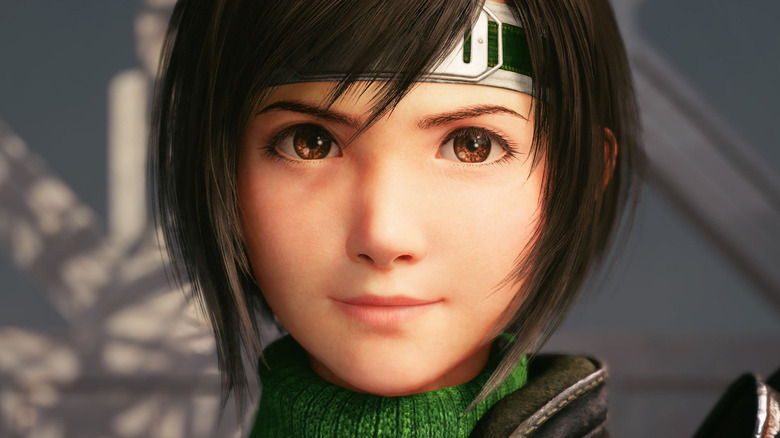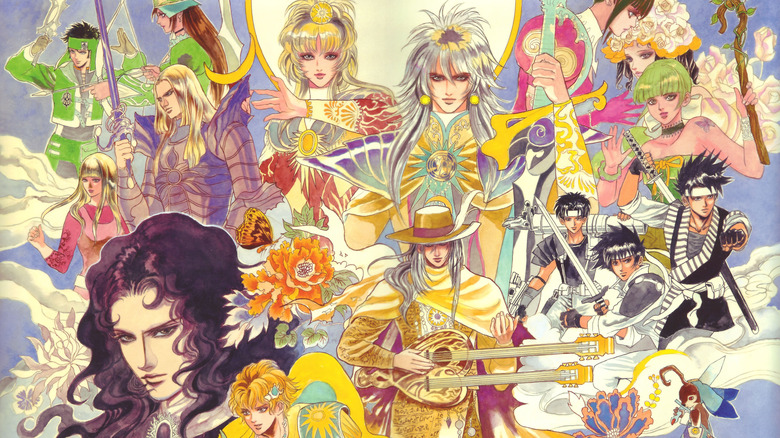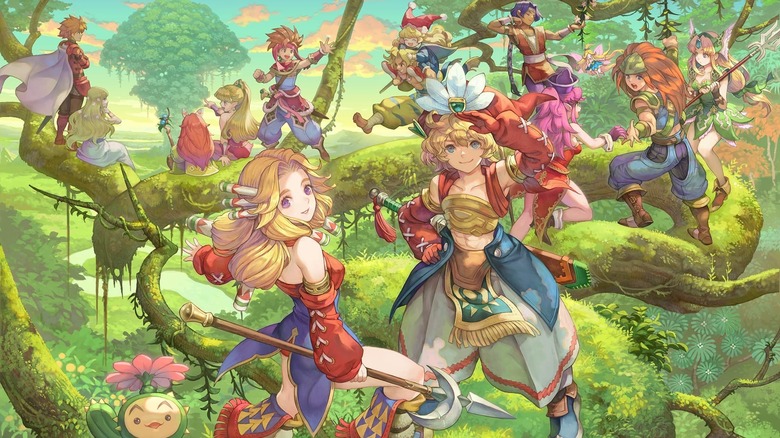Two Classic Final Fantasy Game Boy Games Started Out As Entries In Two Other Franchises
The "Final Fantasy" franchise is a lot bigger than some people might think. Outside the already staggering 15 mainline entries, (with "Final Fantasy 16" slated to come out later this year), there are dozens of sequels, spin-offs, remasters, remakes, and other side games that all bear the "Final Fantasy" name. These have spanned numerous systems, but there is an especially large number of these that were developed for handheld consoles.
The PSP game "Final Fantasy 7 Crisis Core" might be the most well known, but there is a treasure trove of smaller "FF" titles that were developed for the Game Boy. Many of these titles are beloved by gamers — though some fans might not know that two of them weren't originally meant to be "Final Fantasy" titles at all. A lot of older JRPGs could seem a bit similar. Give a hero a sword, a few magic spells, and then set them off on a quest to battle monsters and save the realm -– then publishers could change the title to whatever they wanted. Well, it turns out that's exactly what Square (now Square Enix) did. The games "Final Fantasy Legend" and "Final Fantasy Adventure" weren't intended to be "FF" games at all. The developers originally designed them to be part of two completely different franchises.
The Final Fantasy Legend was the first SaGa game
The 1989 game that would eventually come to be known as "The Final Fantasy Legend" in the West was originally titled "Makai Toushi SaGa" in Japan. A scan of lost box art from the book "Video Game Quest," which attempted to catalog every video game that had been released until that point (per Siliconera), also seemed to indicate that Square also toyed with retitling the game as "The Great Warrior Saga," before it somehow came to be rebranded as a "Final Fantasy" side-game.
SaGa is another open-world JRPG series that was produced by Square — though it was known to lean more toward science fiction than fantasy. Another thing that the franchise was known for that distinguished it from "Final Fantasy" was its nonlinear storylines that offered players choices, resulting in branching paths.
Square has never stated outright why it changed the game's associated franchise, but it seems likely that the company wanted to capitalize on the popularity that the "Final Fantasy" brand had already garnered among Western audiences. Nintendo claims that it was "[t]he first Game Boy RPG to sell over a million units," so if this was Square's strategy, it seems to have worked. Square would follow this same pattern with the Western releases of its sequels as well. "Saga 2: Hihou Denseusu" and "Saga 3: Jikuu no Hasha" came to Western audiences under the names "Final Fantasy Legend 2" and "Final Fantasy Legend 3."
Final Fantasy Adventure was the first Mana game
The other game that started out as part of a different franchise is "Final Fantasy Adventure." This one was originally called "Seiken Densetsu" in Japan, which translates to "Holy Sword Legend." This title was established as the first game in a spin-off series from the "Final Fantasy" franchise that later became known as the "Mana" series in the West.
European and American JRPG fans might be familiar with several games in the "Mana" series, especially since many of the games have just been remastered for the Nintendo Switch, but this first game had a few different titles depending on where gamers bought their copies.
It was released in Europe under the name "Mystic Quest" while its North American counterpart had the name "Final Fantasy Adventure." This is particularly strange given that "Seiken Densetsu" was originally designed to break from the "Final Fantasy" name, only to be returned to it in one of its foreign releases.
Still, this odd naming scheme worked out in a way. Many consider its sequel "Secret of Mana" to be the game where the series truly found its own identity. It was here that "Mana" shifted from the turn-based combat of "Final Fantasy" and started implementing the real-time battle systems that the franchise would later be known for.



